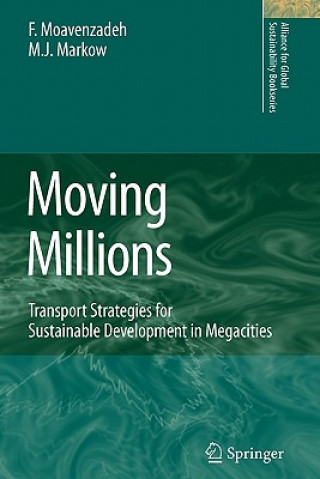
Doručení
Nákupní rádce





Nehodí se? Vůbec nevadí! U nás můžete do 30 dní vrátit
 Dárkový poukaz
V libovolné hodnotě
Dárkový poukaz
V libovolné hodnotě
S dárkovým poukazem nešlápnete vedle. Obdarovaný si za dárkový poukaz může vybrat cokoliv z naší nabídky.
Moving Millions
 Angličtina
Angličtina
 304 b
304 b
30 dní na vrácení zboží
Mohlo by vás také zajímat


Covering a topic of massive contemporary importance, this well written volume demonstrates how transportation strategy and environmental sustainability can be pursued in a comprehensive and harmonious, rather than unconnected and potentially conflicting, set of public policies. It applies lessons from several urban areas (e.g., Bogota, Singapore, Mexico City, Sao Paulo), including "success stories" and less successful "hard-won lessons", to a case study in Guangzhou.This book explores how the issues of transportation strategy and environmental sustainability interact in the context of megacities, especially those megacities in the developing world where the rapid rates of growth in population and economic development outpace the supply of infrastructure. While much of the current literature assumes a tradeoff between transportation and environmental sustainability, this book looks to the synergy between the two if public policies are crafted in the proper way. Transportation infrastructure capacity is typically a serious constraint in urban areas worldwide. Problems in providing additional infrastructure whether related to available financial resources, environmental protection, local institutional capabilities, available technology, available land and land use, social disruption, and other factors tend to be magnified in rapidly developing megacities. Given the reality of these constraints, there are nevertheless several ways in which the demand for transportation and the efficient operability of the available supply can be managed successfully to relieve the pressure on existing infrastructure, accommodate the time needed to build additional capacity, and balance the competing requirements among urban mobility, economic development, and environmental sustainability such that each area sees gains. This book demonstrates how transportation strategy and environmental sustainability can be pursued in a comprehensive and harmonious, rather than unconnected and potentially conflicting, set of public policies. It applies lessons from several urban areas around the world (e.g., Bogota, Singapore, Mexico City, Sao Paulo), including both "success stories" and less successful "hard-won lessons," to a case study in Guangzhou. From these examples, a number of useful guidelines emerge on how the competition for resources between transportation policy and environmental sustainability can be resolved to support continued economic development in megacities. Among the themes identified in the book that contribute to a successful, sustainable transportation strategy are the need for a comprehensive approach that is tailored to local institutional and cultural norms, the need to understand the tradeoffs among competing goals and resolve them in a balanced strategy, the importance of demand-side management as compared to traditional approaches of investment in new capacity, the usefulness of a range of options in public-private partnerships to strengthen the financial and institutional capabilities needed for sustainable transportation, and regardless of the policy that is finally implemented the critical role of government in providing leadership and the underlying institutional framework needed to ensure success.
Informace o knize
 Angličtina
Angličtina
Kategorie




 Jak nakupovat
Jak nakupovat

































